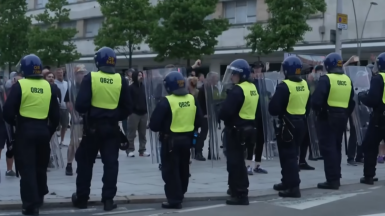
The days of rioting across parts of the UK felt like a "war", said Rev Israel Olofinjana, director of the Evangelical Alliance's One People Commission.
Rev Olofinjana was one of several Christian leaders who joined a panel discussion on Friday exploring some of the root causes behind the riots.
He said that the Church had an important role to play in rebuilding communities in the wake of the unrest, and that a "key question" that needs to be answered is, "What does it mean to be British?"
Danny Webster, the Evangelical Alliance's advocacy lead, said the riots had been a "wake-up call that maybe everything's not ok" in the nation's communities, and that it was important to listen to people's views on what lay behind the riots.
"It doesn't mean that we think those are necessarily accurate or justified but it is important that we listen to what people say is motivating the actions and to understand why people might feel discomfort in their cultural context because of changes that may have taken place in England or across the United Kingdom," he said.
He said that a "strand of hostility" towards immigration and particularly Islam and Muslims has developed within Britain, and that the recent violence "shatters the illusions of harmony that we might have in our communities".
Chine McDonald, Director of the theological think tank, Theos, said that the riots had been "shocking but not actually surprising", and had brought to the surface "the reality that many black and brown people experience, which is that people don't want us here".
"There are certain groups of people that aren't happy with the idea of multiculturalism," she said.
McDonald, who was born in Nigeria and moved to Britain when she was four, spoke of her experience of being asked "where are you really from?" and said that there was a "visible difference that makes people think you are not British".
"For many people, to be British and particularly to be English, is to be white," she said.
She said that social media disinformation and "dangerous" political rhetoric had fuelled hostility towards immigrants, and that it was important to tell the other side of the story, that many immigrants work for the NHS and the education sector, pay their taxes, and have "helped to build this country".
"If we could tell those stories more, then people would have much more positive views about immigrants," she said.
"Part of the complication with this issue is that people lump in all immigrants with illegal immigrants or with asylum seekers, who are a very small proportion of immigrants. We're being told a single story about what immigration is doing to us.
"The reality for many people in the UK [is that] they don't feel like they have access to education or can get a doctor's appointment, they don't feel like they've got enough money in their pocket. So it's easiest to blame someone for that."













